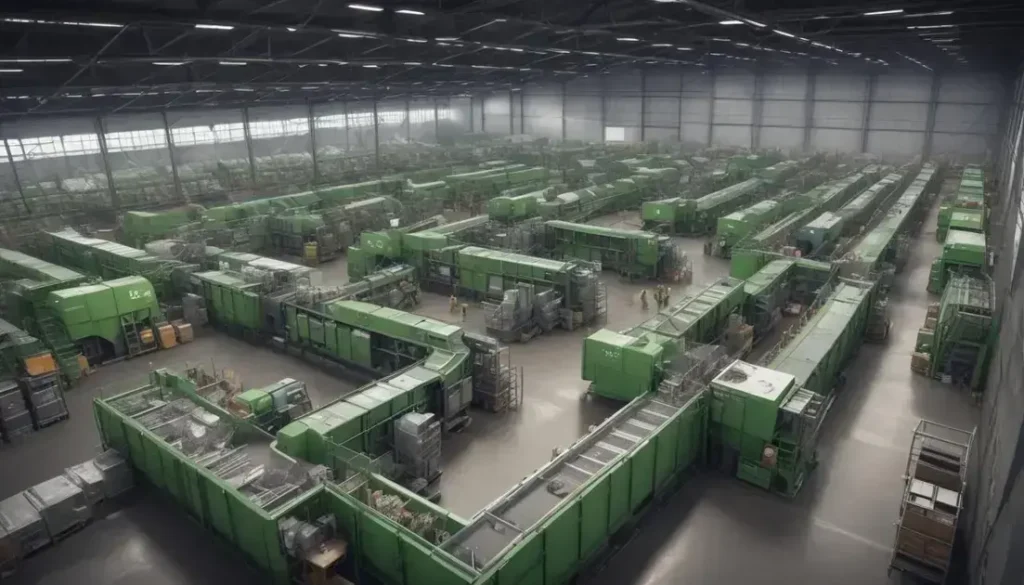The evolution of supply chain dynamics in the automotive industry, particularly for companies like JLR, focuses on technology integration, sustainable practices, and resilience to navigate challenges such as geopolitical factors and changing consumer demands.
In the rapidly evolving landscape of electric vehicles, **Supply Chain** management has become crucial. This article explores JLR’s strategy and its implications for businesses.
Introduction to JLR’s EV Supply Chain Strategy
JLR’s electric vehicle supply chain strategy is pivotal to its ambition of becoming a leader in sustainable automotive manufacturing. Central to this strategy is the focus on transparency throughout the supply chain, ensuring that all materials are sourced ethically and sustainably. This is particularly crucial given the increasing scrutiny from consumers and regulators regarding environmental practices.
To enhance material traceability, JLR is implementing advanced technologies. These innovations facilitate real-time monitoring of resources from extraction through to manufacturing. This ensures compliance with best practices and strengthens the brand’s commitment to sustainability.
Moreover, JLR’s strategy includes actively engaging with suppliers to establish a robust network of responsible resource providers. By fostering partnerships that prioritise sustainability, JLR aims to create an ecosystem where all participants share its environmental goals.
As electric vehicle demand surges, understanding the intricacies of the supply chain becomes more critical than ever. This focus not only enhances operational efficiency but also positions JLR favourably within a competitive landscape, aligning with global trends that favour sustainable practices and ethical supply chains.
The Importance of Material Traceability
The importance of material traceability in the automotive industry cannot be overstated, particularly for companies like JLR embracing electric vehicles. This process ensures that every component, from batteries to body panels, is sourced ethically and sustainably. By establishing a clear chain of custody, companies can confidently assure customers that their vehicles are produced in alignment with environmental standards.
Enhancing traceability involves adopting advanced technologies such as blockchain and IoT sensors. These tools provide real-time tracking of materials, enabling companies to monitor their supply chains closely. This transparency is essential in today’s market, where consumers demand accountability regarding the origins of their products.
Moreover, improved traceability helps companies mitigate risks associated with unethical sourcing. By having reliable data on suppliers, manufacturers can avoid potential scandals and maintain their brand reputation. This is especially critical for JLR as it shifts towards more sustainable practices, aligning with global expectations for environmental responsibility.
Ultimately, establishing a robust framework for material traceability positions JLR not only as a leader in the electric vehicle sector but also as a champion of sustainable manufacturing. Such practices solidify trust with consumers and could result in competitive advantages in an increasingly eco-conscious market.
New Roles for Supply Chain Experts
The evolving landscape of the automotive industry has led to the emergence of new roles for supply chain experts, particularly in companies like JLR. As electric vehicle production ramps up, the need for skilled professionals who can navigate complex supply chains has never been more critical. These experts play a vital role in ensuring that all materials are sourced sustainably and that manufacturing processes align with environmental standards.
One of the key responsibilities for supply chain professionals is data analysis. They must be adept at interpreting data from various sources to identify trends, manage risks, and optimize operations. This requires a solid understanding of both analytics and the technologies driving modern supply chains.
Additionally, these experts are tasked with enhancing collaboration between different stakeholders, from suppliers to manufacturers. They facilitate communication and ensure that everyone is on the same page regarding expectations and standards. Such collaboration is essential in achieving the sustainability goals set by companies like JLR.
Training and development also fall under their purview, as supply chain experts must keep their teams updated on the latest technologies and best practices. As the industry continues to shift toward green initiatives, the ability to adapt and innovate will distinguish successful supply chain professionals.
Challenges in Global Supply Chains
Global supply chains face numerous challenges that can significantly impact the automotive industry, particularly for manufacturers like JLR. One of the most pressing issues is the volatility of raw material prices. Fluctuations can result from geopolitical tensions, natural disasters, or sudden changes in market demand. Such variability requires companies to implement robust risk management strategies.
Moreover, the ongoing effects of the COVID-19 pandemic have revealed vulnerabilities in logistics systems. Disruptions in transportation and delays at ports have highlighted the need for more resilient supply chains. Companies must reassess their logistics networks to enhance flexibility and ensure timely delivery of components.
Another critical challenge is ensuring sustainability throughout the supply chain. As consumers increasingly demand environmentally friendly practices, JLR must navigate complex regulations and standards. Achieving compliance while maintaining efficiency adds a layer of complexity to supply chain management.
Furthermore, managing a diverse range of suppliers complicates the process. Coordinating with various partners to meet quality and sustainability standards requires effective communication and collaboration. Addressing these challenges will be vital for companies aiming to lead in the rapidly evolving automotive landscape.
Ethical Sourcing Initiatives
Ethical sourcing initiatives have become a cornerstone for companies like JLR as they strive for sustainability in their supply chains. These initiatives focus on acquiring materials from suppliers who adhere to stringent environmental and social standards. By supporting responsible sourcing, companies not only enhance their brand reputation but also contribute positively to the communities involved in the supply chain.
One effective strategy in ethical sourcing is the implementation of supply chain audits. These assessments ensure that suppliers comply with regulations and ethical guidelines, reducing the risk of human rights violations and environmental degradation. Regular audits foster transparency and accountability, essential elements for building trust with consumers.
Additionally, JLR engages in partnerships with local communities and organisations to promote sustainable practices. This collaboration not only empowers suppliers but also helps in developing innovative solutions to address environmental challenges. By investing in local initiatives, companies can create shared value, benefiting both their operations and the communities they impact.
Moreover, using technologies like blockchain adds another layer of confidence in tracing the origins of materials. This commitment to ethical sourcing aligns with global trends focused on sustainability, appealing to environmentally conscious consumers who prioritise ethical consumption in their purchasing decisions.
Impact of Geopolitical Factors
The impact of geopolitical factors on global supply chains is increasingly significant, particularly in the automotive sector. Political tensions, trade disputes, and international sanctions can disrupt the flow of materials and components essential for production. For companies like JLR, understanding these dynamics is crucial for maintaining efficiency and competitiveness.
One major area affected by geopolitics is the availability of raw materials. For instance, global dependencies on specific regions for materials like lithium or cobalt can lead to vulnerabilities. When conflicts arise or diplomatic relationships strain, sourcing these materials becomes more challenging, affecting production timelines and costs.
Additionally, changes in trade policies can alter tariffs and regulations, impacting pricing structures. Companies must stay informed about various countries’ political climates to anticipate potential disruptions. This knowledge allows them to develop contingency plans and diversify their supplier networks, reducing reliance on any single source.
Moreover, shifts in consumer sentiment driven by geopolitical events can influence market demand. As consumers become more aware of the implications of their purchases, companies that proactively address these factors can differentiate themselves in the marketplace. Overall, navigating the complexities of geopolitical factors is essential for companies looking to thrive in today’s interconnected and politically charged world.
Training Initiatives for Employees
Training initiatives for employees play a crucial role in ensuring that automotive companies like JLR can adapt to the rapid changes in the industry. As the shift towards electric vehicles continues, it is essential for employees to cultivate new skills that match the evolving technological landscape. Ongoing training helps staff stay updated with the latest manufacturing processes, software, and sustainability practices.
One effective approach is the development of comprehensive training programs that focus on both technical skills and soft skills. Technical training covers areas such as battery technology, manufacturing automation, and supply chain logistics. Simultaneously, soft skills training enhances communication, teamwork, and problem-solving abilities, ensuring employees can collaborate effectively in diverse teams.
Additionally, incorporating e-learning and virtual training modules provides flexibility, allowing employees to learn at their own pace while balancing their work commitments. This method not only boosts retention rates but also makes it easier to track progress and effectiveness.
Moreover, mentorship programs can connect experienced employees with newer team members, fostering a culture of knowledge sharing. Investing in employees through continuous training not only enhances their capabilities but also builds a strong foundation for innovation and competitive advantage within the company.
The Future of JLR and Electric Vehicles
The future of JLR in the electric vehicle market is poised for significant growth, driven by a commitment to sustainability and innovation. As the automotive industry shifts towards greener alternatives, JLR aims to position itself as a leader in electric mobility. This strategic focus involves not only expanding the electric vehicle lineup but also enhancing the existing product range with cutting-edge technology.
One of the key factors shaping JLR’s future is its investment in research and development. By exploring advancements in battery technology, renewable energy sources, and autonomous driving features, JLR can improve vehicle performance and sustainability metrics. These innovations will be crucial in attracting environmentally conscious consumers and meeting regulatory frameworks.
Furthermore, JLR plans to strengthen its collaboration with stakeholders, including suppliers, technology firms, and governmental bodies. Establishing partnerships in the tech sector can help accelerate the development of essential infrastructures, such as charging networks, which are vital for the widespread adoption of electric vehicles.
Additionally, the company recognizes the importance of consumer education and engagement in transitioning to electric mobility. By providing clear information and benefits associated with electric vehicles, JLR can foster a positive perception and encourage adoption among consumers. This holistic approach ensures that JLR remains at the forefront of the evolving automotive landscape.
Conclusion: Evolving Supply Chain Dynamics
The dynamics of supply chains are evolving rapidly, influenced by technological advancements and changing market demands. In the automotive sector, companies like JLR are adapting their strategies to harness the benefits of these transformations. One significant trend is the emphasis on digitisation, which allows for improved visibility and efficiency throughout the supply chain. By utilising advanced analytics and real-time data, businesses can make informed decisions that enhance their operational agility.
Additionally, the focus on sustainability has reshaped supply chain processes. Companies are now prioritising ethical sourcing and environmentally friendly practices. This shift not only caters to consumer preferences but also aligns with global regulations aimed at reducing carbon footprints.
Moreover, the increasing complexities of global trade require businesses to cultivate resilience in their supply chain strategies. As geopolitical factors and economic conditions fluctuate, companies must develop robust contingency plans and diversify their supplier relationships. Flexibility and adaptability are essential for navigating uncertainties in today’s interconnected world.
In conclusion, as supply chain dynamics continue to evolve, organisations that embrace innovation and sustainability will likely lead the way in the competitive automotive landscape. Preparing for the future means staying ahead of these trends and ensuring that supply chains are equipped to meet the demands of a rapidly changing market.
In Summary: Embracing Change in Supply Chains
The ongoing evolution of supply chains in the automotive industry offers exciting opportunities for companies like JLR. By focusing on technology, sustainability, and resilience, businesses can adapt to the changing landscape while meeting consumer demands.
Implementing advanced technologies allows for greater efficiency and visibility, making it easier to manage complex global networks. Additionally, prioritising ethical sourcing and environmental friendliness not only aligns with regulations but also attracts modern consumers.
As the market continues to evolve, companies that embrace these changes will be better positioned for success. Staying flexible and prepared for uncertainties is key to navigating the future of supply chains.
Ultimately, the future of supply chains is bright for those willing to innovate and adapt.
Frequently Asked Questions
What are the main challenges facing modern supply chains?
Modern supply chains face several challenges, including geopolitical issues, fluctuating raw material prices, and the need for sustainability.
How can technology improve supply chain efficiency?
Technology enhances supply chain efficiency by providing real-time data analytics, improving visibility, and streamlining communication between stakeholders.
Why is sustainability important in supply chains?
Sustainability is important because consumers increasingly demand environmentally responsible practices, and regulations are tightening around ethical sourcing and environmental impact.
What role does training play in supply chain management?
Training equips employees with the skills necessary to adapt to new technologies and practices, ensuring that the workforce is prepared to meet evolving supply chain demands.
How can companies ensure ethical sourcing in their supply chains?
Companies can ensure ethical sourcing by conducting supplier audits, partnering with responsible suppliers, and utilising technology for material traceability.


